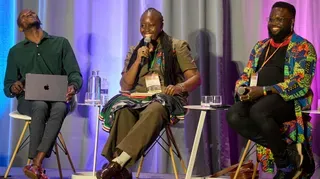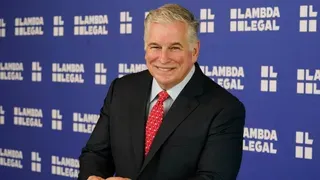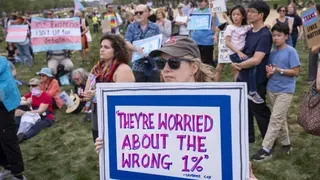August 19, 2010
U.K. Catholic Adoption Agency Must Aid Gay Couples
Kilian Melloy READ TIME: 6 MIN.
An agency that regulates charities in the UK has reconfirmed its original ruling against a religious adoption service that had refused to place children with gay and lesbian couples.
The agency, known as the Charity Commission, had found against the Diocese of Leeds chapter of Catholic Care in June of 2009. A subsequent High Court decision last March forced the Charity Commission to pay the court expenses of Catholic Care and to re-examine the case. The outcome remained the same, however, reported Civil Society.com on Aug. 19.
The Charity Commission found that there were no "particularly convincing and weighty reasons justifying the proposed discrimination" of the adoption service against gay and lesbian families.
"In certain circumstances, it is not against the law for charities to discriminate on the grounds of sexual orientation," noted Andrew Hind, chief executive of the Charity Commission. "However, because the prohibition on such discrimination is a fundamental principle of human rights law, such discrimination can only be permitted in the most compelling circumstances." Added Hind, "We have concluded that in this case the reasons Catholic Care have set out do not justify their wish to discriminate."
U.K. media service Sky News quoted further from Hind in an Aug. 19 story. "This has been a complex and sensitive decision which the Commission has reached carefully, following the principles set out by the High Court, case law and on the basis of the evidence before us," said Hind, going on to note, "Clearly the interests of children are paramount."
The adoption service had claimed that its services were needed to place children in need of stable, loving homes, especially hard to place children. However, the Charity Commission found that there were adequate alternatives in place to see to the needs of children and prospective adoptive parents. Moreover, the Charity Commission was satisfied that gay and lesbian families provide good homes for children in need, having consulted with local authorities on the matter.
In its appeal to the high Court, Catholic Care had argued that unless it were allowed to refuse its services to same-sex couples, financial support from the Catholic church would dry up, recounted U.K. newspaper The Guardian on Aug. 19.
The Guardian also reported that the struggle on the part of the church to ensure that religious charities would be granted exemptions from anti-discrimination laws had played a part in Pope Benedict XVI's "unprecedented papal outburst" earlier this year, in which Benedict denounced the U.K.'s anti-discrimination laws. The pope wrote that, "The effect of some of the legislation designed to achieve this goal has been to impose unjust limitations on the freedom of religious communities to act in accordance with their beliefs. In some respects it actually violates the natural law upon which the equality of all human beings is grounded and by which it is guaranteed."
"Catholic Care will now consider whether there is any other way in which the charity can continue to support families seeking to adopt children in need," an unnamed spokesperson for the charity said. "In any event, Catholic Care will seek to register as an adoption support agency offering a service to those who were adopted in the past and are now seeking information about their background, and also to support adoptive parents already approved by Catholic Care."
"Other Catholic agencies have either withdrawn from placing children or have cut their ties with the church since the British government imposed anti-discrimination rules in 2007," noted an Aug. 19 Associated Press article on the story.
Similar Clashes in the States
In the United States, similar clashes between religious charities and civil laws protecting LGBTs have taken place, with the result that church-sponsored charities have stopped placing children in need of adoption altogether rather than be compelled to serve gay and lesbian families. Last February, following the legalization of marriage equality in Washington, D.C., the Catholic church in halted its adoption work, which was carried out through Catholic Charities, an organization that drew $20 million per year in taxpayer money. The Catholic Church teaches that gays and lesbians are "disordered" individuals who are "called" by God to lead celibate lives.
After marriage equality became legal in Massachusetts in 2004, a local Catholic adoption charity faced similar difficulties. The charity, which had placed children with same-sex parents, was ordered by church authorities to desist such placements, in violation of anti-discrimination statutes. The charity subsequently ceased all adoption placements.
Anti-gay religious news sites and other organizations are incited by such developments at home and from abroad, touting them as evidence of an impending "criminalization of Christianity." American religious groups expressed alarm earlier this year over a case in which a U.K. street preacher faced charges after allegedly telling passers-by that gays and lesbians were living "sinful" lives.
The charges against street preacher Dale Mcalpine were dropped following an offer by Peter Tatchell, a prominent British GLBT equality activist, to testify on his behalf. Standing on the principle that, "Freedom of speech must be defended, even for homophobes," Tatchell offered his testimony in defense of the street preacher.
Mcalpine was arrested last May in a shopping district where he had been handing out leaflets and proselytizing to passers-by about the "sinfulness" of homosexuality, among other subjects. Police said that Mcalpine was voicing anti-gay views in a loud voice; Mcalpine said that he had a quiet and respectful one-to-one conversation with a female passerby about homosexuality. The case generated international headlines in the blogging community, with anti-gay religious pundits pointing to Mcalpine's arrest as proof that anti-discrimination laws erode religious liberties and freedom of expression.
"It wasn't very busy" on the day of his arrest, "but within about five minutes I noticed two police community support officers in fluorescent waistcoats and blue peaked caps watching from about ten feet," Mcalpine told the media. One of the policemen was Sam Adams, a GLBT community liaison officer who is gay himself, according to media reports. Adams told Mcalpine that people had complained about the street preacher, and warned him against hate speech. "I told him I was not homophobic but sometimes I did say that the Bible says homosexuality is a crime against the Creator, but it was not against the law to say this," recounted Mcalpine, going on to say that Adams "then told me he was gay and he was the Lesbian, Gay, Bisexual, Transgender liaison officer for the police. I said, 'It is still a sin,' and our conversation ended," said Mcalpine. "It wasn't a loud or aggressive conversation."
Later on, Adams left the scene--but several other officers arrived and placed Mcalpine under arrest under the 1986 Public Order Act, a law passed to combat soccer fans' rioting in the streets after matches. Mcalpine was arrested under provisions that make it a crime to cause "harassment, alarm, or distress," taken in, and detained for seven hours.
"I felt deeply shocked and humiliated that I had been arrested in my own town and treated like a common criminal in front of people I know," said Mcalpine, who contested the police claim that he was loudly uttering anti-gay speech. "My freedom was taken away on the hearsay of someone who disliked what I said, and I was charged under a law that doesn't apply." Added Mcalpine, "If you are preaching hate and calling on people to harm others, it is right that is against the law. But I would never do that. If we have a free society, I should be allowed to preach the Gospel as generations have before me."
The recent ruling in a federal court that overturns an anti-gay ballot initiative as unconstitutional was also condemned by American anti-gay religious groups, who declared that the ruling carried an implicit threat against pastors citing Biblical passages while denouncing gays from the pulpit.
CNSNews reported in an Aug. 16 story that Liberty University's Mathew Staver interpreted a passage from U.S. District Judge Vaughn Walker's ruling on Proposition 8, the 2008 anti-gay ballot initiative that saw California voters rescind marriage rights from the state's gay and lesbian families, as proof that Christians were in peril of legal persecution. Walker's ruling found that Proposition 8 had violated the Constitutional guarantees of due process and equal protection by targeting a minority for the loss of rights enjoyed by the majority.
"Religious beliefs that gay and lesbian relationships are sinful or inferior to heterosexual relationships harm gays and lesbians," wrote Judge Walker at one point in his 136-page opinion. Anti-gay groups disagreed.
"It's an astounding statement by a judge, and if that finding were to be upheld, it would criminalize Christian beliefs, because the Bible and Christian beliefs historically have clearly indicated that homosexuality is sex outside of marriage--and is contrary to God's design," Staver claimed. "For this judge to say that Christian beliefs or religious beliefs contrary to homosexuality are actually harmful--what that essentially says is, that if that's the case, then you've got to change your religious beliefs, and if you don't, you're going to be penalized as result. That is a very dangerous aspect of this court decision."
Elsewhere in his opinion, Judge Walker wrote the marriage ban imposed by Proposition 8 "both unconstitutionally burdens the exercise of a fundamental right to marry and creates an irrational classification on the basis of sexual orientation."
Moreover, Walker wrote, proponents of Proposition 8 relied on "unfounded stereotypes and prejudices" about gays. "Proposition 8 played on the fear that exposure to homosexuality would turn children into homosexuals and that parents should dread having children who are not heterosexual," Walker noted.
Kilian Melloy serves as EDGE Media Network's Associate Arts Editor and Staff Contributor. His professional memberships include the National Lesbian & Gay Journalists Association, the Boston Online Film Critics Association, The Gay and Lesbian Entertainment Critics Association, and the Boston Theater Critics Association's Elliot Norton Awards Committee.







